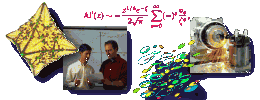|
 |
 |
|
 |
||
| Up |  |
|
 |
Attaching Uncertainties to Predictions from Quantum Chemistry ModelsKarl K. IrikuraChemical Informatics Research Group, Chemical Sciences Division, MML Tuesday, March 3, 2015 15:00-16:00, Quantum chemistry models are used to predict many physical and chemical properties of molecules, materials, and more complex systems. These models are based upon quantum mechanics, usually the non-relativistic Schrödinger equation. Many physical and mathematical approximations are necessary to make computations feasible. Unfortunately, most of these approximations are uncontrolled in the sense that there are no parametric uncertainties that can be propagated forward. I will point out why uncertainties are needed and speculate on why the research community neglects this need. Most of the progress has emerged from a collaboration between MML and ITL over several years. Speaker Bio: Karl did undergraduate research in biomolecular simulations and experimental catalysis, graduate work in experimental gas-phase ion chemistry, and post-doctoral work in electronic structure theory before coming to NIST to work with Jeff Hudgens measuring laboratory spectra of free radicals. After his NRC postdoc ended, he was hired onto the staff to work in computational quantum chemistry. Since then, he has applied quantum chemistry to problems in thermochemistry, spectroscopy, mass spectrometry, and organic chemistry.
Contact: R. N. Kacker Note: Visitors from outside NIST must contact Cathy Graham; (301) 975-3800; at least 24 hours in advance. |